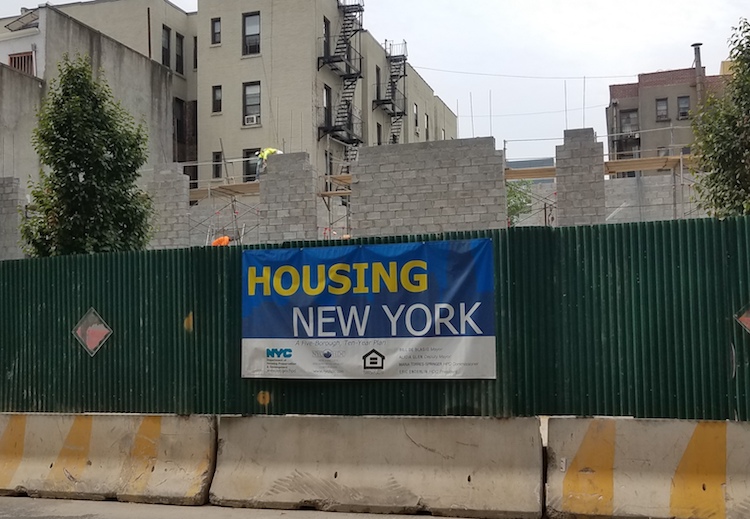
Jarrett Murphy
An affordable housing construction site on 127th Street in Harlem.The city will save approximately $30 million dollars in its operating budget through its plan to cut the Dept. of Housing Preservation and Development’s capital budget by 40 percent, or $1 billion, according to a new New York Housing Conference analysis, which called the savings “minimal” and the capital cuts a blow to the city’s affordable housing goals.
The analysis found that the de Blasio administration’s cuts to the capital housing budget by $583 million during the current Fiscal Year 2020 saved an estimated $16.8 million for the following year’s operating budget, while the $457 million cut planned for Fiscal Year 2021 could save approximately $13.2 million—however, those funds would have to be spent in the first half of the fiscal year. The analysis took into account that the city’s capital budget is funded with bonds, which are returned through the operating budget via debt service payments over a 30-year period.
HPD saw its capital budget slashed from $1.48 billion to $902 million this fiscal year, part of the city’s cost-saving efforts to address the economic fallout from the COVID-19 crisis. The housing budget is also slated to drop from $1.19 billion to $741 million in the following fiscal year, pushing more than 40 percent of the capital program for affordable housing into later fiscal years.
Advocates say the amount the city would save from the cuts, a meager $30 million, is not worth the loss of jobs, housing units and economic growth which could come with restoring HPD’s capital budget for affordable housing.
“The cuts for 2020 resulted in a large decrease in affordable housing production. We all know we need housing now more than ever; the need is a given. But an economic analysis shows that the cuts provide very little savings while there are strong reasons for spending money on housing right now,” reads the report.
The losses resulting from the housing cuts over the next two fiscal years would include 21,000 affordable units, decreased production that could result in 22,176 fewer construction jobs, 12,096 jobs in other related industries and the loss of $7.98 billion in economic spending, the analysis found.
“We need the housing, we need the economic spending, we need the jobs and it just doesn’t seem worth it to give that up for $30 million in savings,” said Brendan Cheney, the director of policy and communications at New York Housing Conference. Cheney spoke with the city’s Independent Budget Office for the analysis.
New York City’s day-to-day operating budget is normally funded through the city’s Expense Budget and paid for with the revenue collected by the city, primarily from taxes, fees, fines, or grants from other governmental entities. The annual operating budget covers expenses such as city employees and contracts, while the capital budget provides funding for long-term projects such as schools, bridge and road repairs, or purchases of land, buildings, and durable equipment such as garbage trucks. The capital budget is financed through the sale of long-term bonds, which is paid by the city through the annual debt service payments included in the operating budget.
Cheney said it is an opportune time for New York City to take advantage of low-interest rates.
“One of the things that the city is trying to do is defend the cuts by saying that they’re really just moving money into the out years. And there’s a lot of problems with that. One is that there’s not a good reason to think the economy’s going to be better in a couple of years,” he said. “If you have the ability to spend the money now, while interest rates are low, you should spend it and you should invest right now [which] can also help the city to start recovering.”
The de Blasio administration’s proposed budget cuts are an effort to meet an estimated $9 billion revenue shortfall. In the budget agreement passed in July, the City Council was able to save some critical housing programs, despite the cuts to HPD, including $3.2 million for foreclosure prevention programs, $3.1 million for community housing preservation strategies, $1.7 million for the home loan program and $637,500 for the Community Land Trust Initiative (for which advocates were hoping for $850,000).
However, the city’s pilot program to help legalize basement apartments, a major policy promise associated with the 2016 East New York rezoning, saw its budget cut by $1.09 million, leaving the program with only $91,580 for operations. Initially, the basement pilot program, which was launched last year, was slated to receive $12 million dollars for operational costs during a three-year period.
The entire city budget was adopted in July by the City Council and administration. However, the city has not yet unveiled its capital commitment plan, which will authorize new and on-going projects —detailing costs, project length and unexpected expenses for things like rezoning plans, infrastructure or school construction.
The de Blasio administration is expected to present that plan for the upcoming fiscal year in the next few weeks. Advocates are continuing to push for it to include the restoration of HPD’s capital budget for affordable housing, however, any changes now could be a long shot.









